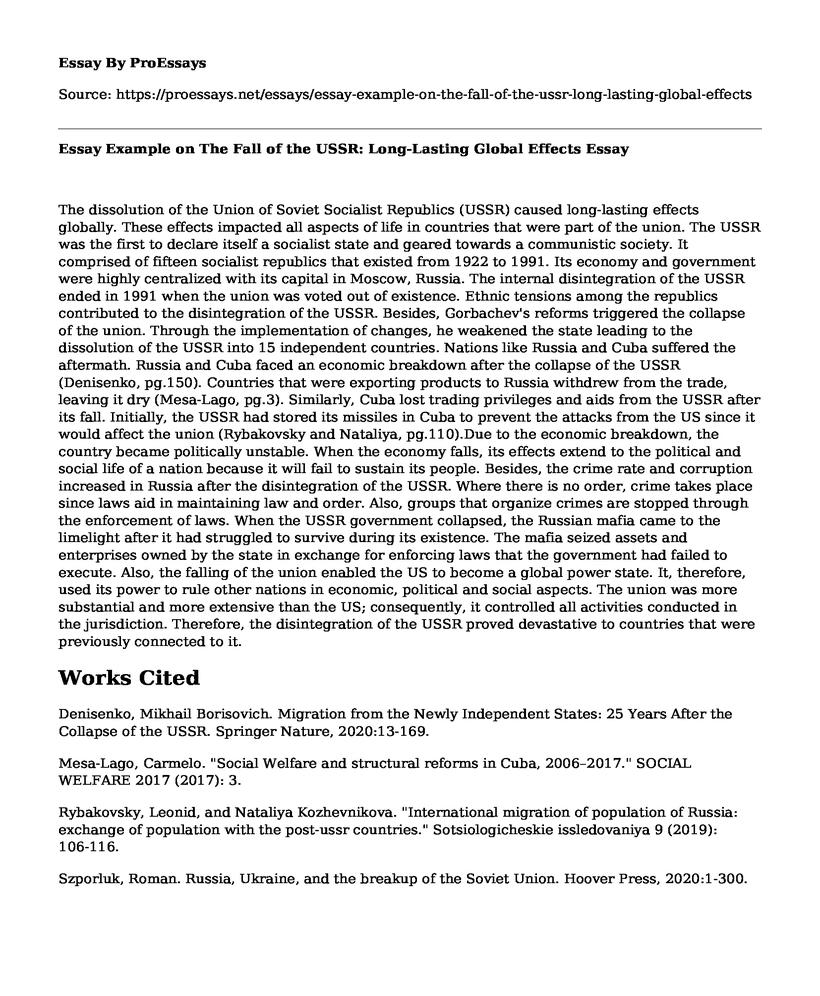The dissolution of the Union of Soviet Socialist Republics (USSR) caused long-lasting effects globally. These effects impacted all aspects of life in countries that were part of the union. The USSR was the first to declare itself a socialist state and geared towards a communistic society. It comprised of fifteen socialist republics that existed from 1922 to 1991. Its economy and government were highly centralized with its capital in Moscow, Russia. The internal disintegration of the USSR ended in 1991 when the union was voted out of existence. Ethnic tensions among the republics contributed to the disintegration of the USSR. Besides, Gorbachev's reforms triggered the collapse of the union. Through the implementation of changes, he weakened the state leading to the dissolution of the USSR into 15 independent countries. Nations like Russia and Cuba suffered the aftermath. Russia and Cuba faced an economic breakdown after the collapse of the USSR (Denisenko, pg.150). Countries that were exporting products to Russia withdrew from the trade, leaving it dry (Mesa-Lago, pg.3). Similarly, Cuba lost trading privileges and aids from the USSR after its fall. Initially, the USSR had stored its missiles in Cuba to prevent the attacks from the US since it would affect the union (Rybakovsky and Nataliya, pg.110).Due to the economic breakdown, the country became politically unstable. When the economy falls, its effects extend to the political and social life of a nation because it will fail to sustain its people. Besides, the crime rate and corruption increased in Russia after the disintegration of the USSR. Where there is no order, crime takes place since laws aid in maintaining law and order. Also, groups that organize crimes are stopped through the enforcement of laws. When the USSR government collapsed, the Russian mafia came to the limelight after it had struggled to survive during its existence. The mafia seized assets and enterprises owned by the state in exchange for enforcing laws that the government had failed to execute. Also, the falling of the union enabled the US to become a global power state. It, therefore, used its power to rule other nations in economic, political and social aspects. The union was more substantial and more extensive than the US; consequently, it controlled all activities conducted in the jurisdiction. Therefore, the disintegration of the USSR proved devastative to countries that were previously connected to it.
Works Cited
Denisenko, Mikhail Borisovich. Migration from the Newly Independent States: 25 Years After the Collapse of the USSR. Springer Nature, 2020:13-169.
Mesa-Lago, Carmelo. "Social Welfare and structural reforms in Cuba, 2006–2017." SOCIAL WELFARE 2017 (2017): 3.
Rybakovsky, Leonid, and Nataliya Kozhevnikova. "International migration of population of Russia: exchange of population with the post-ussr countries." Sotsiologicheskie issledovaniya 9 (2019): 106-116.
Szporluk, Roman. Russia, Ukraine, and the breakup of the Soviet Union. Hoover Press, 2020:1-300.
Cite this page
Essay Example on The Fall of the USSR: Long-Lasting Global Effects. (2023, Sep 04). Retrieved from https://proessays.net/essays/essay-example-on-the-fall-of-the-ussr-long-lasting-global-effects
If you are the original author of this essay and no longer wish to have it published on the ProEssays website, please click below to request its removal:
- A Discussion of the United States Constitution
- Instrumental and Non Instrumental Value of Democracy Paper Example
- Research Paper on Democracy: Government by the People, for the People
- Essay on Honoring the Efforts of All Involved for Accessible Toronto Libraries
- Essay Example on Congress' Power to Tax for Common Defence and Welfare
- Machiavelli's Philosophy in Modern US: A Good Government? - Essay Sample
- Essay Example on Risky Ventures: Ignoring the Consequences of Bureaucracy







